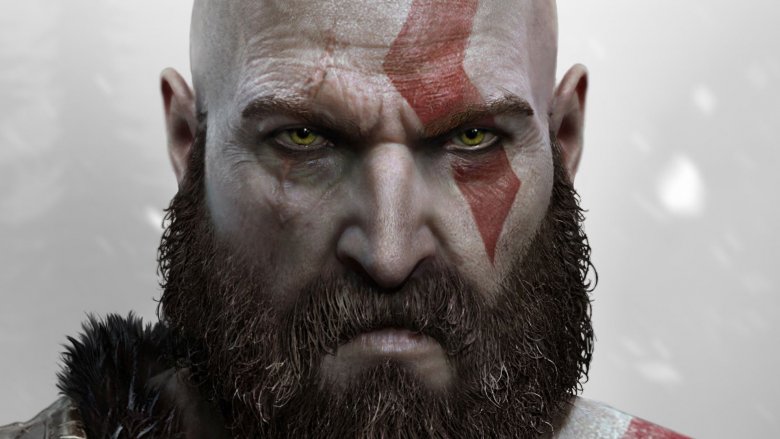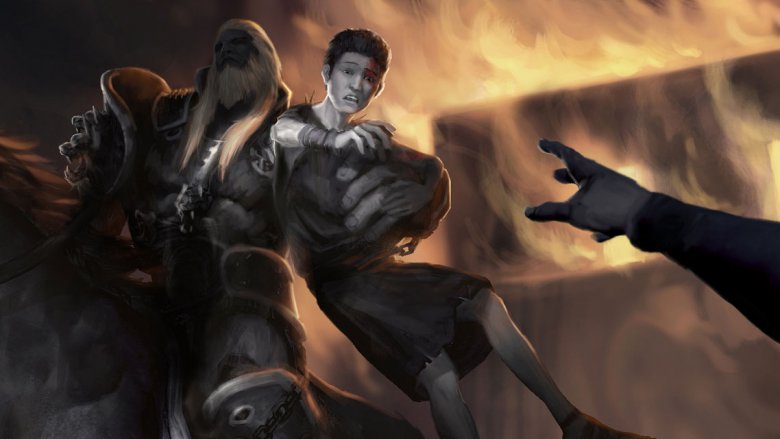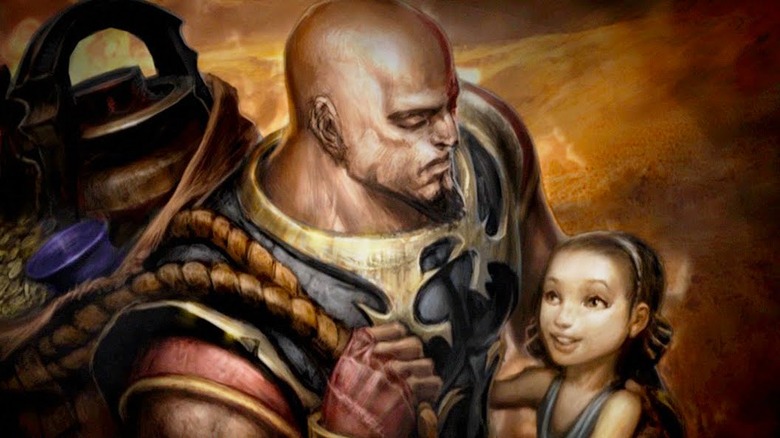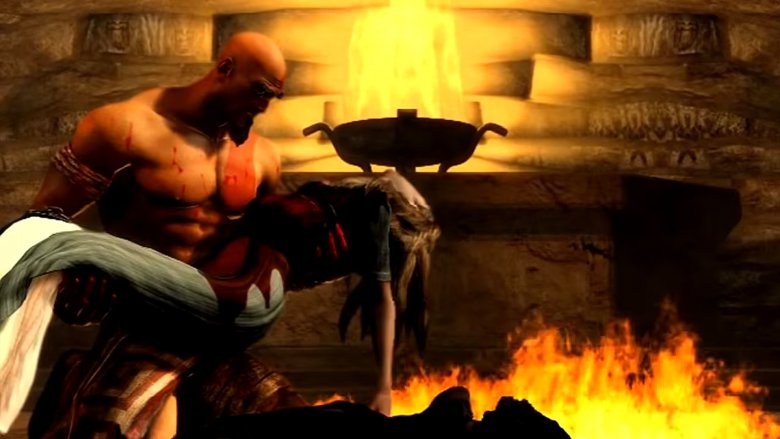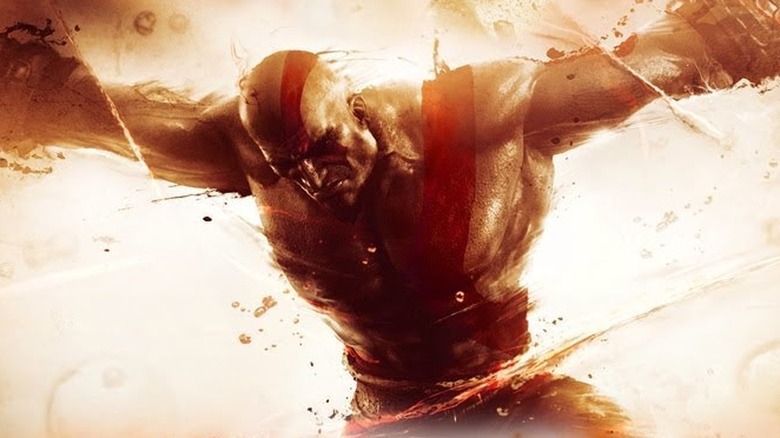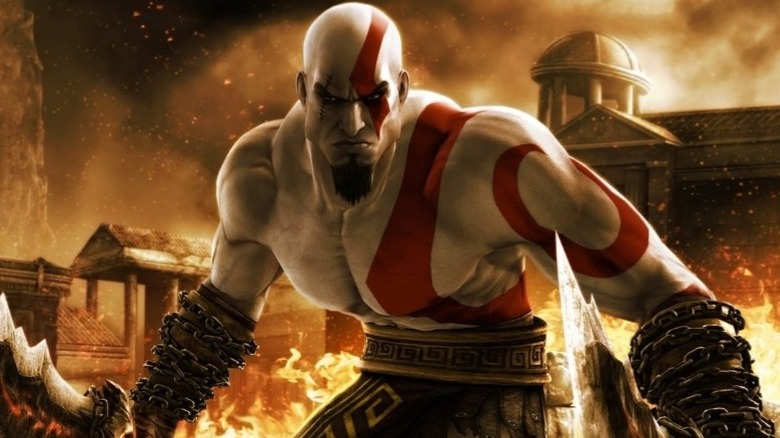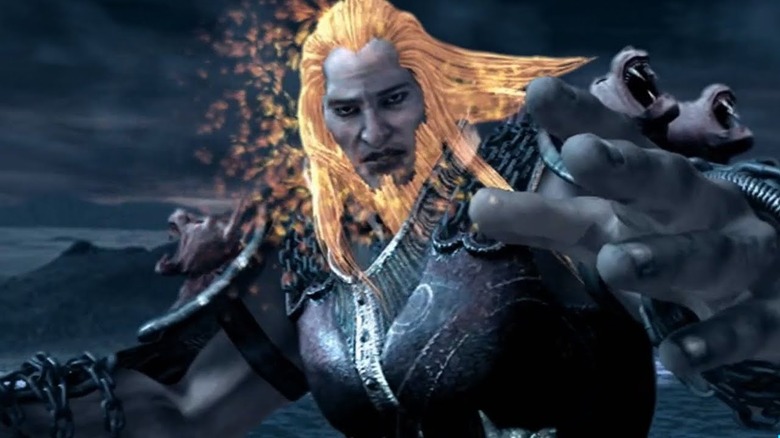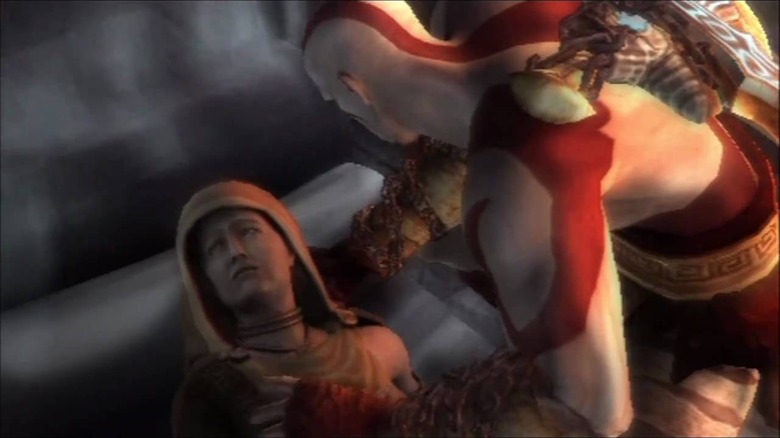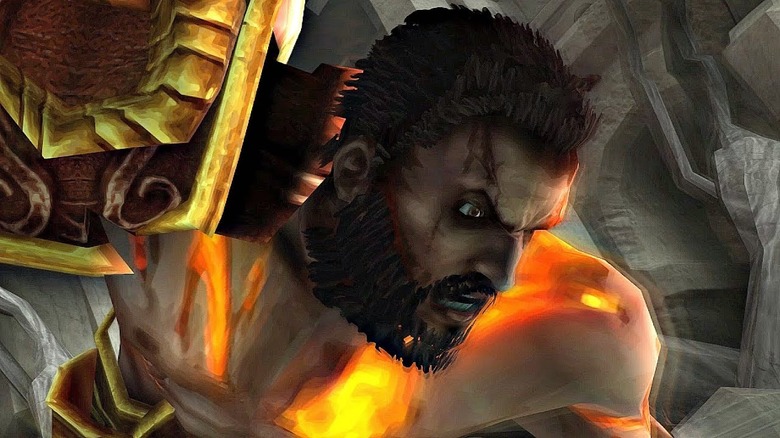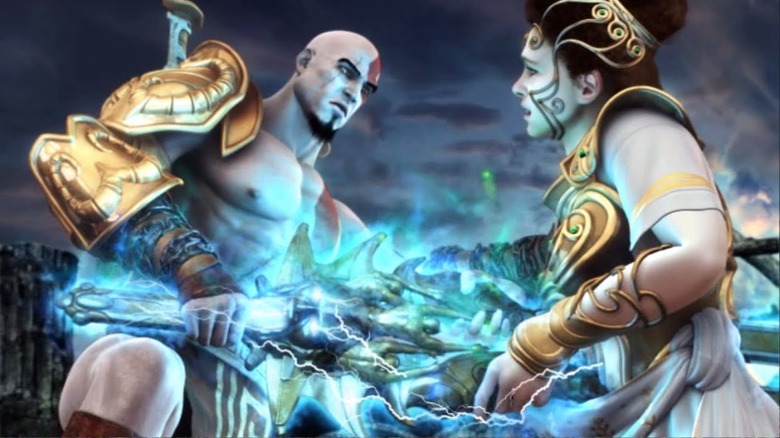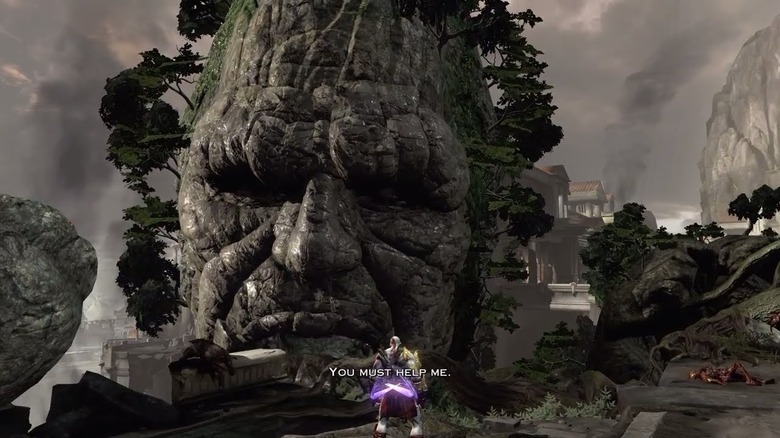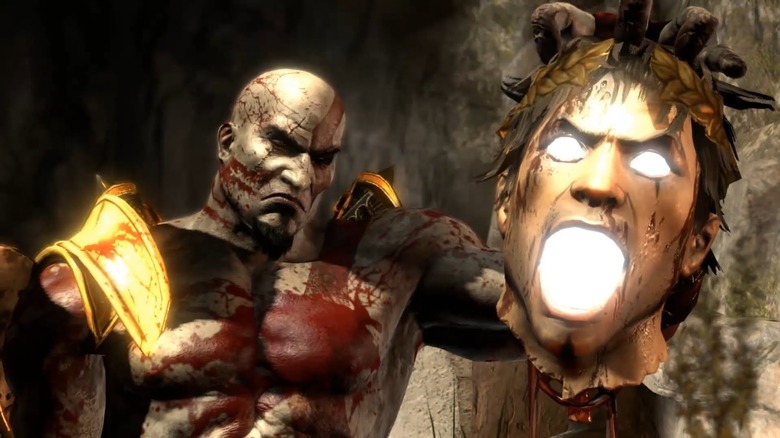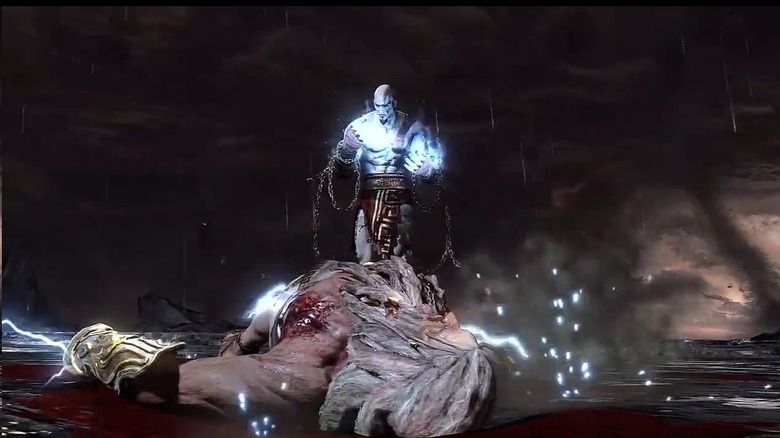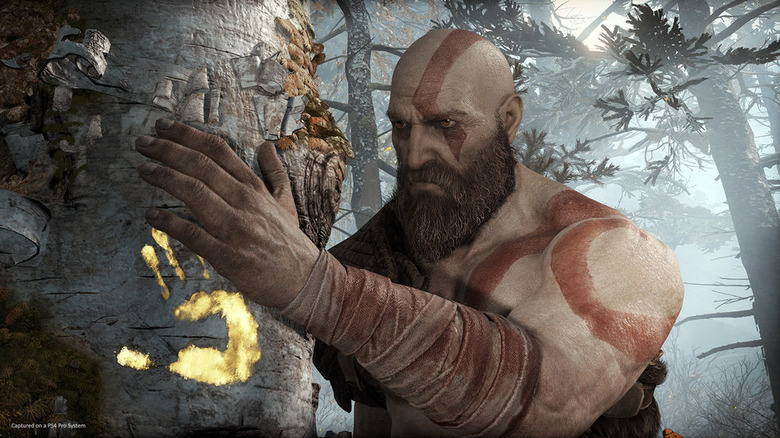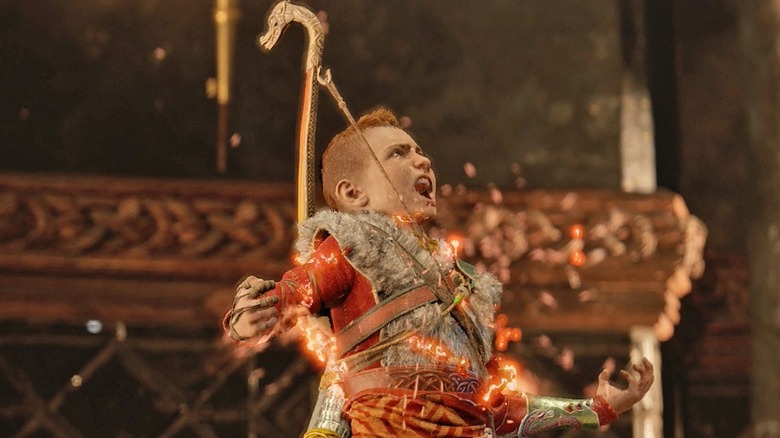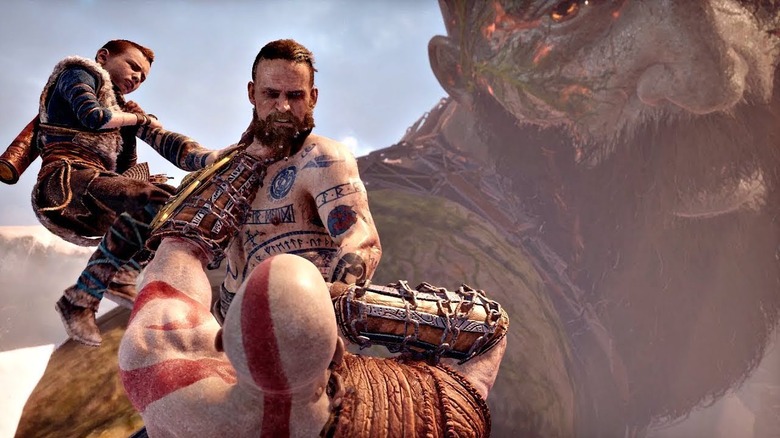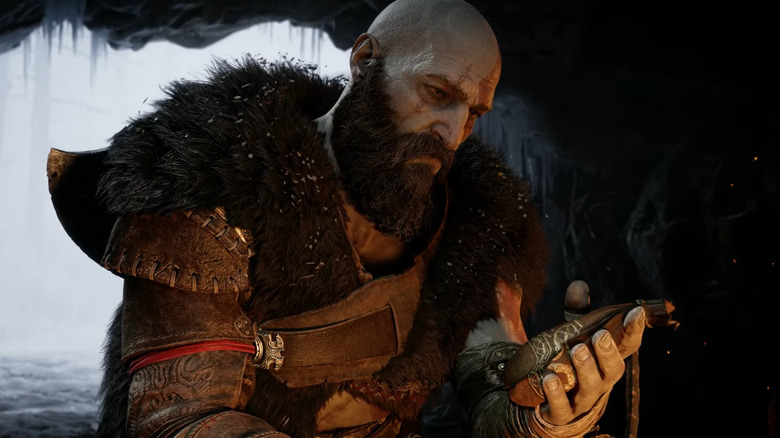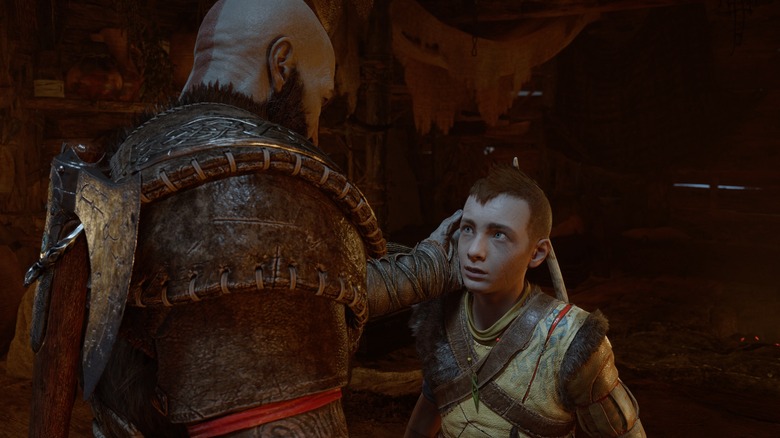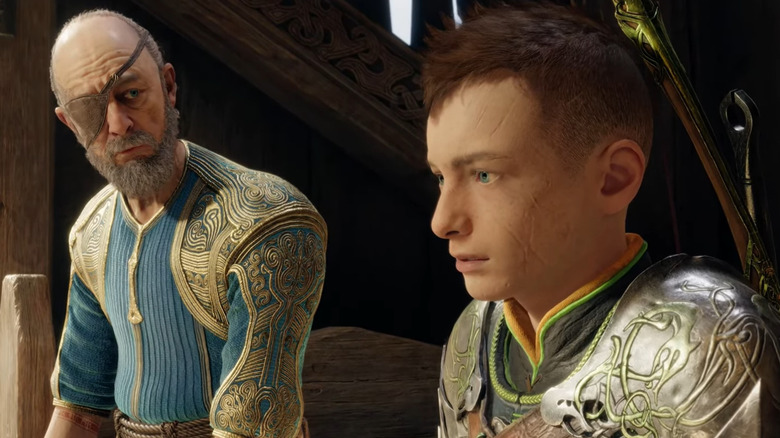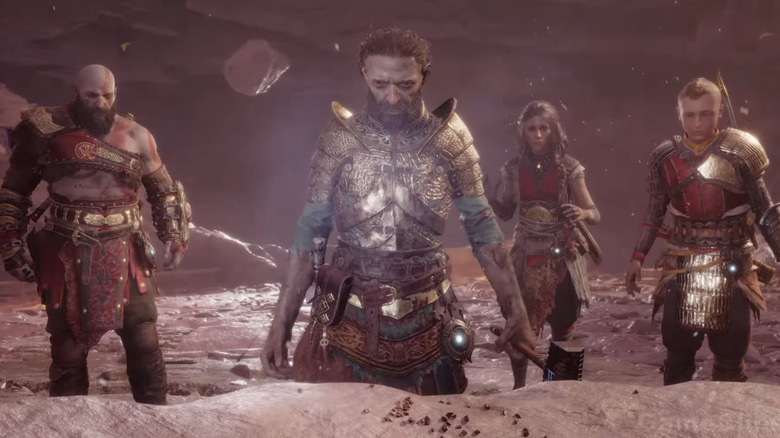The Entire God Of War Timeline Explained
Kratos carried a lot of baggage with him when he left the realms of the Greek pantheon and moved on to the cold north where the Aesir rule just as capriciously as Zeus ever did. 2018's "God of War" served as a convenient jumping in point for players new to the PlayStation games, but it's not where Kratos' story begins, or ends for that matter. Despite everything he has been through, Kratos isn't yet allowed to rest. That's not how God of War games work.
Even players with zero knowledge of the previous games can tell that Kratos hasn't exactly had an easy life, what with that famous frown. There's many a good reason as to why he's got a permanent frown and an axe to grind with anything near divine. We're here to go over every scar and every battle that shaped the Ghost of Sparta into the man (or demigod) that he is today.
Zeus is the baby daddy
The story of "God of War" is the story of Kratos, but he wasn't always marked as the main character. As revealed in "God of War: Ghost of Sparta," that honor (or curse) originally went to his younger brother Deimos. Kratos and Deimos were born to Callisto, one of Zeus' many side chicks that his wife Hera hated. Kratos and Deimos trained, dreaming of joining the Spartan army, but they were still skinny little kids the fateful day that the gods showed up.
It turned out that there was a prophecy that one of Zeus's own children, a marked child, would kill him. Deimos was born with red birthmarks all over his body, so the King of the Gods sent Athena and Ares to get rid of Deimos while he was still just a scrawny kid. Kratos tries to stop them, but gets backhanded by Ares for his trouble, leaving him with a scar over his eye. As you might imagine, this experience leaves an impression on Kratos, so much so that he gets red tattoos all over his body to honor Deimos. What was that prophecy again? A marked child of Zeus...
Family life
Kratos grows up to be anything but scrawny, which is a good thing considering that Sparta will throw you out for being weak. This is what the city-state threatens Kratos' sickly daughter Calliope with, as seen in the "God of War" comics. When little Calliope contracts a plague, the only thing that could possibly save her from the cruel fate of the weak is Ambrosia, the food of the gods. Kratos goes on a quest to find it, unknowingly the champion chosen by Ares in a great game of the gods; each has a champion also determined to get the Ambrosia for themselves.
So along the way, Kratos encounters other warriors, whose godly sponsors get seriously pissed when Kratos kills them. Hades' champion, Alrik of the barbarians, proves to be one of the most difficult challenges that Kratos faces, especially because Hades decides to set the sky on fire. But Kratos overcomes, bringing the Ambrosia back to Calliope and healing her. After this odyssey, Kratos gets a promotion, honored with the rank of "captain" from the King of Sparta himself.
With great power ...
Kratos gets really serious about his job. He's something of a workaholic, and the work is war. Determined to make Sparta's glory known everywhere, Kratos becomes a bloodthirsty warmonger. However, karma comes for him when his army is defeated by the forces of Alrik the barbarian king, who is after revenge since Calliope got the live-saving Ambrosia rather than Alrik's father. Before Alrik can strike the killing blow, Kratos calls out to Ares and promises to serve him in exchange for sweet, sweet victory.
This is where Kratos gets the Blades of Chaos, their chains burning into his arms as a sign of his pact with Ares. Kratos goes about killing, slaughtering, and murdering innocents in Ares' name, until Kratos' last remaining link to his humanity is his family. Ares decides to get rid of them, teleporting them to a temple in a village that Kratos is pillaging. He didn't recognize his wife and daughter until it was too late: to his own horror, Kratos realizes that he has just murdered his own family. He burns their bodies in the temple, grieving and guilty. Fans learn in the first game of the series that Kratos has been cursed to wear his family's ashes, marking him as the Ghost of Sparta. This is why Kratos looks bone white.
Breaking chains
Rather than crafting the perfect warrior, Ares creates his greatest enemy, because Kratos is pissed. Like, renounce-all-fealty-and-vow-revenge pissed. But one does not simply quit on the God of War. Ares isn't exactly a father who inspires loyalty, and so in "God of War: Ascension," his son Orkos reveals that it had been Ares' plan to use Kratos as a way to usurp Zeus. The Furies capture Kratos again and torture him with illusions of his past, and he nearly gives into the sweet deal of living in a pleasant dream of a his family forever, but he chooses reality over fantasy.
After finally defeating all the Furies, all that is left is breaking his ties to Ares. This can only be done through killing Orkos, who had been a steadfast comrade throughout the game. Orkos wants an honorable death, to be finally freed from his father. Upon killing Orkos, the bond is broken, and a seal inside Kratos bursts. The Ghost of Sparta is now plagued with nightmares of his past, which let's be real, is pretty dang nightmarish.
Errand boy of the gods
Kratos enlists as a sort of divine errand boy: promising to do whatever the gods ask in order to atone for his sins. Five years after breaking his ties to Ares, he notices that the sun just kind of falls out of the sky. Whoops! In the darkness, the God of Dreams Morpheus places the Olympian gods in a deep sleep, leaving Kratos to solve the case of the kidnapped sun.
Taking a trip to the Underworld, Kratos discovers that the titan Atlas stole Helios, the Sun God. Persephone, Queen of the Underworld, offers Kratos the chance to meet with his daughter Calliope again. However, to enter the Elysium Fields, Kratos must give all his powers up. Kratos gets a brief moment of happiness with Calliope before Persephone reveals that she was the mastermind behind the kidnapping of Helios. She planned on using Atlas to destroy the Pillar of the World and by extension, all the gods. Kratos is forced to leave Calliope behind. He kills Persephone and puts Atlas in chains again. Escaping the Underworld on the Sun's chariot is tiring work, and he falls, but is caught by Athena.
Kratos vs the God of War
Back to 2005's "God of War." Athena seems to have a soft spot for Kratos. Maybe it's because she, too, has a vendetta against the God of War. Athena tells Kratos that the final task that will release him from the nightmares of his past is using Pandora's Box to destroy Ares.
The Box is in Pandora's Temple, which is nailed to the back of the titan Cronos. Kratos has to find the Titan Horn, use it to summon Cronos, and then play at "Shadow of the Colossus" by climbing his great big grandfather. Despite surviving the Temple, he's no match for the giant pillar that Ares hurls at him, impaling and killing the Ghost of Sparta. But Kratos has crawled out of hell before, and he does it again.
Regaining Pandora's Box, Kratos uses it to get swole, able to take on Ares one-on-one. Ares fights dirty, psychologically torturing Kratos before he notices the Blade of the Gods. Using it to kill Ares, Kratos finds his victory hollow: he still has nightmares. Kratos tries to kill himself, but is saved by Athena, who offers Kratos Ares' old job as God of War.
Finding Deimos
One of Kratos' first tasks as a new god is job security. In "God of War: Ghost of Sparta," he goes on a quest to destroy the Ambrosia to make sure that the old Ares won't be revived by his followers. Retracing the steps of his old quest seems to jog his memory, and he gets a vision of his mother in the Temple of Poseidon. Kratos travels to a surprisingly dry Atlantis and finds that his mother is still alive. She tells him that his brother Deimos is still alive, tortured in the Domain of Death by Thanatos, the Death God. Before she can tell Kratos of his true parentage, she is transformed into a monster and dies in his arms.
On his way to save his brother, Kratos encounters another titan, Thera. Freeing her from her volcanic prison, Kratos essentially sinks Atlantis. Before he can even make it to Thanatos' temple, he's attacked by the God of the Tides. After surviving this gauntlet, he's surely ready for a warm reunion with his brother. That's not what he gets.
Super angry demigods
When Kratos finds Deimos, he gets a punch to the face rather than a hug from his long lost brother. Deimos blames Kratos for not saving him, and they fight like true Spartan warriors. Thanatos ruins their reunion with taunts about the "marked warrior" prophecy and how even now Kratos is unable to control his fate. He steals Deimos' life, and Kratos quickly avenges his brother.
Time passes, and Kratos' relationship with Olympus is shaky at best. In "God of War 2," Kratos kills a messenger of the gods, officially putting him on Zeus' naughty list. Things come to a head when Kratos assists Sparta in conquering Rhodes. An eagle steals his strength, leaving him as an above-average human to fight the Colossus of Rhodes. Zeus offers Kratos the Blade of Olympus, and the God of War puts his last strength into the sword, killing the Colossus but finding himself crushed and dying beneath it. Zeus, who was the eagle all along, demands that Kratos serve him, but Kratos isn't into it. Zeus kills Kratos with the Blade, and Kratos swears vengeance with his very last breath.
Time heist
Remember the titans? They're important. Specifically, the titan Gaia saves Kratos and sends him on a mission to seek out the Fates, who can manipulate time. Gaia wants Kratos to execute a time heist in order to get the Blade of Olympus, and by extension his divinity, in order to defeat Zeus. As always, this is easier said than done.
When he at last makes it to the Sisters of Fate, they also put up quite the fight. Kratos, as he's so wont to do, manages to kill all three of his enemies and take control of his fate. He travels back to the moment of his most recent death and tackles Zeus. They fight fiercely, with Kratos gaining the upper hand. Before he can strike the killing blow, Athena sacrifices herself to save Zeus, ostensibly to prevent the destruction of Olympus. She reveals that Zeus is his father and Kratos is the "marked warrior" destined to destroy the gods. Kratos is cool with this, but unsympathetic to her pleas. He then vows to destroy all the gods.
No, seriously: Remember the titans
Kratos goes back in time to the moment before all the titans were destroyed by the Olympians. With their might, he storms Olympus. The gods have killed titans before and do it again, but with Kratos in the mix, the two forces aren't so evenly matched. At the top of "God of War 3," Kratos brutally kills Posiedon, unleashing the fury of the sea and effectively drowning all of Greece. Gaia and Kratos go to take on an injured Zeus, but he sends them plummeting toward the Underworld. Saving only herself, Gaia calls Kratos nothing more than a useful tool.
Fallen yet again into the Underworld, Kratos encounters a specter of Athena. Her death has enlightened her and now she's totally down for some good old fashioned patricide. According to Athena, Kratos would need to extinguish the Flame of Olympus in order to do away with Zeus. Further into the Underworld, he meets Hephaestus, who is despairing over his exile and his missing daughter Pandora. Hades on the other hand is ready to throw down with Kratos. Using the Blades of Exile that Athena's ghost gifted him with, Kratos manages to defeat Hades and steal his soul.
Kratos kills more gods (go figure)
Escaping the Underworld, Kratos cuts down Gaia for her betrayal and continues on his warpath toward vengeance and now the Flame of Olympus. Helios, the Sun God, doesn't give good information to Kratos and pays for it with his life, plunging the world into darkness. After finding Pandora's Box and being informed by Athena that to put out the Flame of Olympus, he'll need Pandora herself, Kratos kills another god. With Hermes' humiliating death, a deadly plague spreads to every living thing.
When Kratos kills Hercules, the world doesn't suffer, but Hercules sure does. When Kratos encounters Aphrodite he doesn't leave her ... untouched. But she's just fine after their sweaty battle in the bedroom. Returning to Aphrodite's husband Hephaestus in the Underworld to find out more about Pandora, Kratos finds that he has wronged the Smith God in more ways than just by sleeping with his wife: when Kratos opened Pandora's Box, Zeus was infected with Fear. This led him to stealing Pandora, the key to the Box made living, and banishing Hephaestus. The Smith God sends him to find a stone in the belly of Cronos with which he promises to make a special weapon ... if Kratos survives.
When Kratos returns victorious, the Smith God tries again to kill Kratos, but winds up dead himself. When Kratos rescues Pandora, she reminds him so much of Calliope that, as Hephaestus had, he thinks of her as a daughter.
The cycle of patricide
In the final fight between father and son, Kratos manages to impale both Zeus and an angry Gaia on the Blade of Olympus. Zeus' spirit, powered by Fear, still has fight left in him and tortures Kratos with his own memories. Pandora sacrifices herself to open the Box and put Zeus down once and for all. In the end, Kratos murders his father with his bare hands. Zeus' death plunges the world into chaos, which Athena appeared ready to rebuild with the power of Hope, the final power in Pandora's Box.
Kratos had seen that the Box was empty, however, and Athena realizes that the evils in the box had infected the gods when Kratos had first opened it, and Hope had suffused itself with Kratos. He releases Hope into the moral world by impaling himself with the blade, left to die by a disappointed Athena. "God of War 3" ends with the broken Kratos slinking away to somewhere else, unseen.
Norse God of War
When we join Kratos again in 2018's "God of War," Kratos is cursed to forever walk the earth. He takes the Blades of Chaos and travels north toward a new land and a new life. Only the Grecian world was affected by his war on the gods, so the realm of the Norse gods is untouched. There he meets Faye and marries her, fathering Atreus. While Faye knew about Kratos' past and godhood, they keep it a secret from Atreus, who didn't really get to know his father as a child. Before her death, Faye instructs them to spread her ashes on the highest peak in all the Nine Realms. She also has them cut down specially marked trees, which had shielded her from the sight of the gods.
Turns out that like Kratos, Faye had an antagonistic relationship with the Norse pantheon. She was a Frost Giant, a great warrior in the war against the Aesir. The moment the gods sense her ashes, Baldur shows up seeking her out for less-than-friendly reasons. Baldur is seemingly invincible and Kratos barely manages to beat him back so that he and Atreus can set out on their journey.
Like father like son
This journey toward the highest mountain peak leads them into the path the mysterious Witch of the Woods, who advises them that they will have to retrieve the Light of Alfheim in order to pass the Black Breath that blocks their way to the mountain. Travel through the realms is done through Tyr's Temple, which sits in the middle of the Lake of the Nine. After their adventure in Alfheim, father and son happen upon Baldur and Thor's sons interrogating a trapped Mimir. Mimir is all kinds of smartass and smart, informing Kratos and Atreus that the peak they seek is actually in Jotunheim.
Making Mimir's severed head into a belt accessory, it is revealed that the Witch is actually Freya, Odin's ex-wife. Thor's kids, Magni and Modi, attack Kratos and Atreus at the behest of Odin himself, leading to Atreus activating his very first Spartan Rage, which very nearly kills him. Freya tells Kratos that his sickness is due to Atreus thinking he's mortal when he's really a god. The cure is in Helheim, where the Leviathan Axe is useless. Kratos is forced to unearth the Blades of Chaos to save his son.
Breaking the cycle
When Atreus is healed and learns the truth of his and his father's divinity, he's pretty jazzed. This turns into arrogance, with Kratos fearful that Atreus will wind up like Kratos: bloodthirsty and uncaring. Atreus needlessly kills a thoroughly defeated Modi, who had been beaten by his father Thor for leaving Magni to die. He also disobeys Kratos and attacks Baldur instead of crossing into Jotunheim. Knocked into Helheim, the three have to take the long way back to Midgard.
Once there, they have to take a trip into the belly of the World Serpent to piece together the final requirements to get to Jotunheim. Baldur attacks again, leading to a family reunion between himself and his mother Freya. Baldur hates Freya for making him invulnerable, and thus unfeeling. Kratos prevents him from killing her, breaking the cycle of children killing their parents. Freya's spell is broken by mistletoe, but Baldur still wants revenge. Kratos is forced to snap the god's neck, and Freya is furious, vowing revenge. The death of Baldur also kickstarts the end times, which will blanket the world in snow and eventually bring about Ragnarök, the final war between the Norse gods.
At last in Jotunheim, Kratos and Atreus discover a mural prophesying their journey, their future, and Atreus' true name: Loki. Having discovered more about Atreus' godly heritage, Kratos and his son make their journey back home. Unfortunately, their battles are far from over. Atreus has a prophetic dream that warns them of the next threat: Thor is coming.
Fimbulwinter
The ending of "God of War" brought Fimbulwinter to Midgard. The cold is a prelude to Ragnarök and a sure sign that more violence is to come. In the opening mission of "God of War Ragnarök," it is revealed that years have passed. Kratos and Atreus are living their lives in the cold and doing their best to prepare for the war just around the corner.
Tensions are beginning to rise between Kratos and his son. After an attack from Freya leaves their wolf Fenrir dead, the two argue about whether or not they should keep hiding in Midgard. Not long after that, Odin and Thor finally arrive at Kratos' home. Odin promises to leave the two of them alone as long as Kratos agrees to come to Asgard with him and Atreus ends his secret search for Týr, the norse god of war. Kratos refuses the deal, and after fighting Thor, he and Atreus take refuge at Yggdrasil, the world tree.
Atreus admits to his father that he has been looking for Týr, but only because he wants to find a way to prevent Ragnarök. Kratos still wants to keep his son safe from the bloody wars that he fought as a younger man, but he agrees to go to Alfheim to help Atreus with the search. After rescuing Týr, they come to learn that Ragnarök might not mean total destruction for everyone.
Fathers and sons
Relationships between fathers and their children have always been a major focus in the "God of War" storyline. From the beginning of the game it's clear that Kratos and Atreus are at odds over how to approach Ragnarök . Having fought wars before, Kratos just wants to protect his son, but Atreus wants to learn more about his Giant heritage, and he's seemingly entranced by prophecies that hint at Loki ruling the nine realms.
The two of them have a falling out, and Atreus finds himself transported to Jötunheim. While there, he discovers a mural that depicts Loki joining forces with Odin. The mural also shows Atreus a version of Ragnarök that seems to end in his father's death. Before going home, Atreus gains the ability to use spiritual stones to store the souls of living beings.
When Atreus and Kratos are reunited, their renewed argument is cut short when Freya attacks them. She is still seeking revenge for Baldur's death, but she agrees to let them live if Kratos will help her break the curse that keeps her trapped in Midgard. Kratos agrees, and as they travel together, they share their history of loss and vengeance. Eventually, the two of them discover have more in common than they thought.
Constructing the Mask
After freeing Freya from her curse, Kratos and Atreus return home. Their argument about what to do as war brews in the realms reignites. Atreus decides that the best course of action is to sneak away to Asgard alone, hoping to find a solution to the conflict that doesn't end in Kratos' death.
Once in Asgard, it doesn't take long for Atreus to encounter Odin. The Allfather explains that once tried to look into the rift between worlds to find a solution to Ragnarök, but the attempt left him blinded in one eye. Now he wants to construct a powerful mask that will allow him to safely look into the rift and gain all knowledge. Atreus agrees to help Odin, believing that he'll be able to use the mask to find a solution himself.
Meanwhile, Kratos has been looking for Atreus with the help of Freya and Mímir. Along the way, he learns that Heimdall is prophesied to kill Loki. Kratos' subsequent murder of Heimdall is one more step in the direction of Ragnarök. Kratos reunites with his son while fighting the giant wolf Garm, and together the two plan for Atreus to sneak back into Asgard and steal the Mask from Odin. They give the Mask to Týr, who turns out to have been Odin in disguise all along. His identity revealed, Odin slays their friend, the dwarf named Brok.
With their plans thoroughly scattered, Kratos and Atreus to Ragnarök as their final option.
Ragnarök
Kratos gathers his forces and leads an assault on Asgard. He uses the Gjallarhorn to enlist help from all the realms, and a multitude of armies charge into an epic battle. Kratos' forces find themselves on the backfoot as the fight begins, but eventually — thanks to the help of a revived Fenrir and the world serpent Jörmungandr — they begin to turn the tide.
The time arrives for Kratos and Thor to square off once again. Kratos, turning a new leaf at last, tries to reject violence and talk down the fight. He tells Thor that their children are friends and that it's up to the two of them to put their differences aside and to try and create a better future together. Odin arrives and orders Thor to kill Kratos, but when his son refuses, Odin stabs Thor through the chest and tries to finish the fight himself.
Ultimately, with the help of Freya and Mímir, Kratos is able to overpower Odin. Atreus snaps the Mask in half and traps Odin's soul within a stone — and almost immediately, Brok's brother Sindri grabs the stone and smashes it. The final moments of Ragnarök leave Asgard in ruins, but Kratos and Atreus are able to escape. As the game ends, Atreus decides to go off to search every realm for the lost Giants, and Kratos finds a mural that hints at the possibility of him taking Odin's place as the Allfather.

